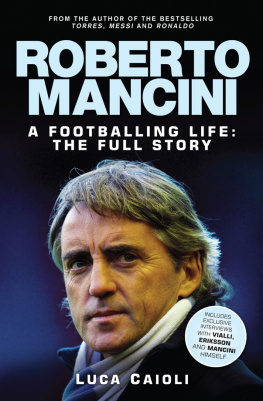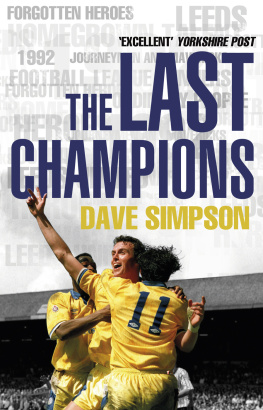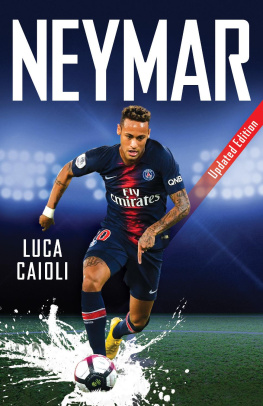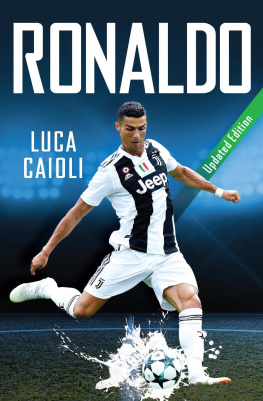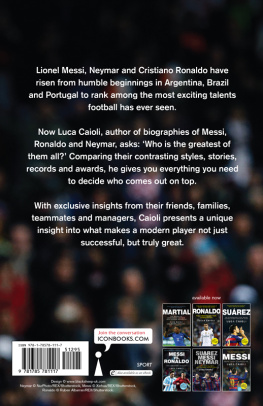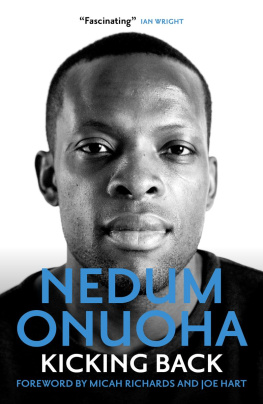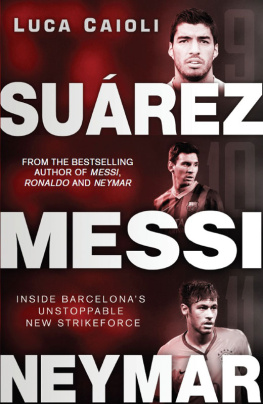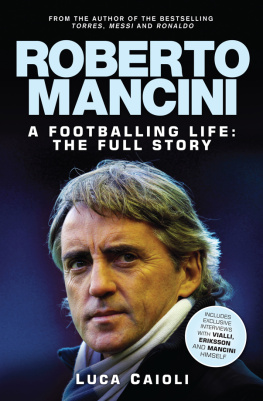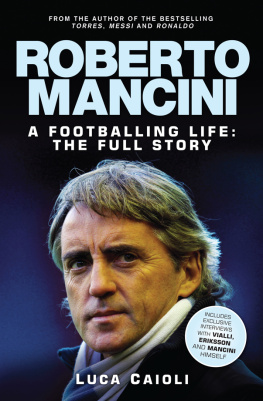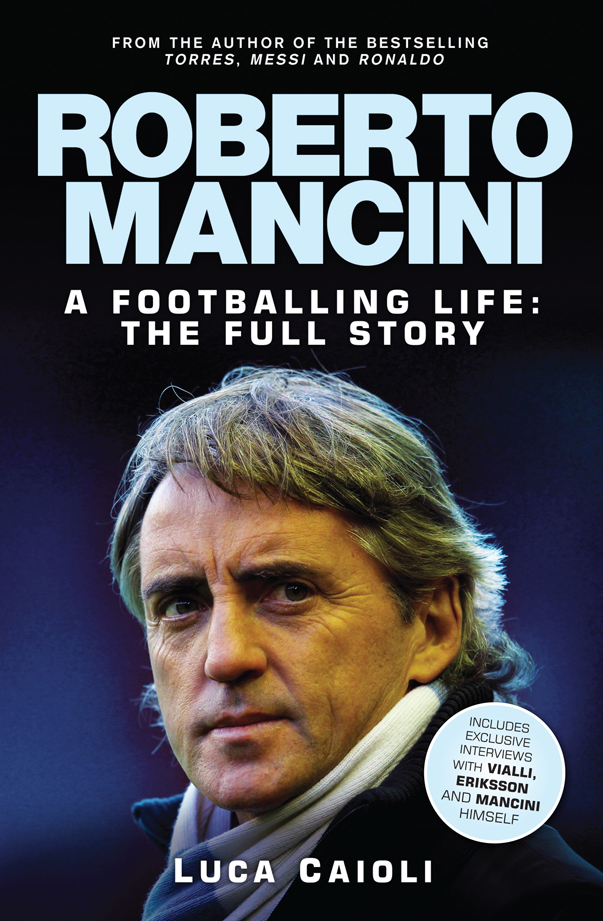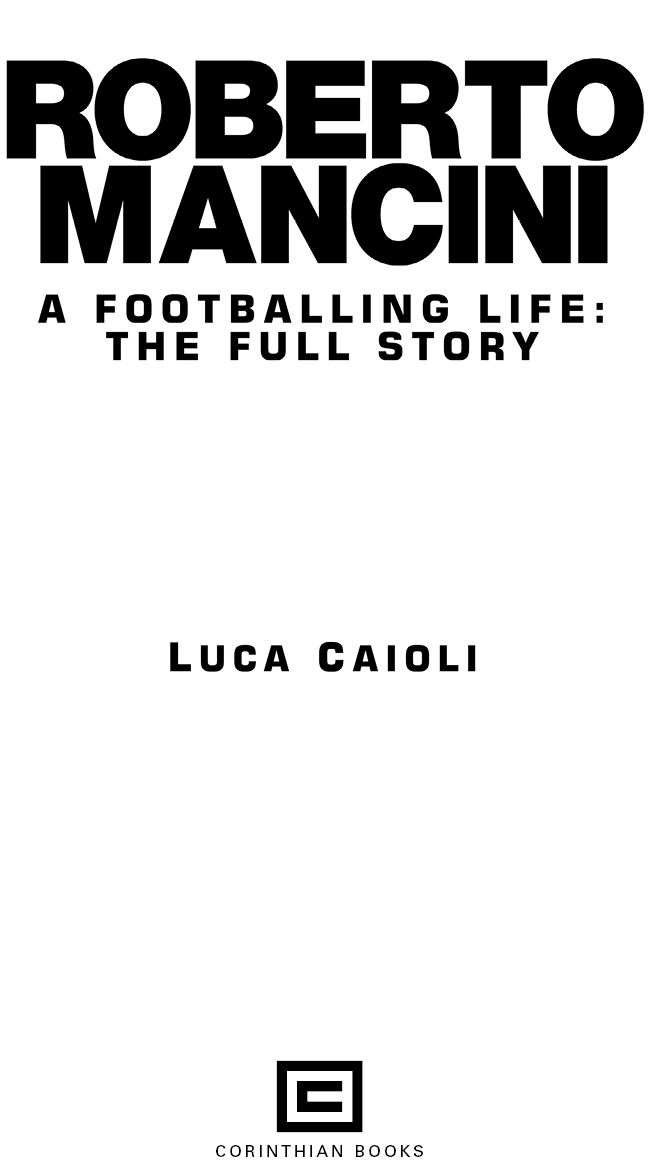The author has asserted his moral rights.
No part of this book may be reproduced in any form, or by any means, without prior permission in writing from the publisher.
In the Blue, Painted Blue
Lesson five: Introduce yourself to your classmates.
Hi. My names Roberto. Im 17. I live in Bologna, but I was born in Jesi. Ive got one younger sister. I like football. I play for Bologna FC first team. I hope to play very well and score many goals. Besides football, I like watching basketball games. I love listening to music. My favourite singer is Renato Zero. I enjoy going to the movies with my teammates. My favourite actor is Sean Connery. I have seen all the James Bond films. My favourite dish is lasagne, cooked by my mother. My favourite drink is Coca-Cola. Thank you. Glad to meet you.
Who knows, maybe this is how it all began that is, Roberto Mancinis long flirtation with England: with an English course. Il Bimbo The Boy as he is known in Casteldebole, Bolognas training headquarters, has given up school and is studying English at his clubs request. If he passes his final exam, Bologna will pay for the course. This involves books, audio cassettes and taught classes. In his bedroom, Mancini listens and repeats sentences, idioms and phrasal verbs, a real pain for a 17-year-old boy whose only interest is football.
However, this will be his life one day. Two big names will describe to him what such a life might be like: Graeme Souness and Trevor Francis, both of whom will be teammates of Mancini in his early years at Sampdoria. The former won three European Cups with Liverpool; the latter two, with Nottingham Forest. Two legends of the beautiful game. With Trevor, Roberto will make feathers fly, and it will end in classic Old West style; still, his experience with such a high-profile player will prove invaluable.
Then later will come David Platt, who will be a close friend of Mancini and eventually his trusted first-team coach at Manchester City. Roberto having managed to persuade the Sampdoria president to sign Platt, the England midfielder will try to reciprocate the favour at a later date, arranging his transfer to Arsenal, where the pair will be reunited.
It is the beginning of November, 1995. Mancini, after a bad spell with referees and a harsh disqualification, is having dark thoughts. He believes that Sampdoria, his club for the past 13 years, have lost their ability to challenge for the Italian championship. The Gunners seem ready to do anything to bring him to Highbury. It is very tempting for Roberto, who had already entertained thoughts of a move earlier in the year. This time, Mancio is ready to go. Living in London is a very appealing thought. He reckons he can find new challenges and gain new experience: of a different football culture, with less stress; of the faster-paced British game. He believes his family could be more serene, his sons could learn English properly, and so could he. However, in the end he cant pluck up the courage to cut the strings attaching him to Sampdoria. His fascination for England lasts, though, and comes back in waves.
December 1996: Sven-Gran Eriksson, his manager at Samp, signs a preliminary contract with Blackburn Rovers and wants to take his playmaker with him. Again, nothing comes of it. Mancini hears good things about the UK from Gianluca Vialli, too, his former strike partner who moved to Chelsea in 1998. Mancini and Vialli have always shared their experiences in life, and they still do over the phone. But it will take some time yet for Mancini to follow his goal twin (as the Samp fans would have it) to British shores.
In 2001, thanks to Erikssons contacts (the Swede is now manager of the England national team), Mancini ends up at Leicester City. He is 36 when he makes his debut in the Premier League, against Arsenal, on 20 January. He starts with a bang, but then fizzles out: he hasnt played a proper match for eight months, since his final game for Lazio the previous May.
He enjoys his spell with the Foxes, but it doesnt last. Coaching, which Mancini is very keen to try, lures him to Florence. His style is already very British. In fact, Serse Cosmi, the Perugia manager the first opponent Roberto faces claims that some people wanted to picture this as a challenge between the butchers son i.e. me and some newcomer from Buckingham Palace. The fact is, Mancini has already defined his style. He is choosing the right clothes, custom-made by his Neapolitan tailor, or from the Giorgio Armani collection. His favourite colour is blue. On his wrist, classy watches. Tied around his neck, in a loose knot, those cashmere scarves that will become his trademark. His shoes are strictly made in England. He likes Ferraris and Bentleys fast as James Bond.
Years go by, and Mancini masterfully perfects his image, while confirming his talent for winning. He looks over to England again. Rumours grow: there are mentions of Tottenham while he is still coaching Lazio, and later, after he departs Inter Milan, they speak of Portsmouth, Notts County, Chelsea, Liverpool, Sunderland.
The option is always there, at the door, because the footballing culture of England the tradition, the stadiums, the supporters is intriguing indeed for a manager. Then comes the right chance: Manchester City. Id rather work to help bring success to those who havent won anything for a while, Mancio will say in an interview. That, after all, is what happened with Sampdoria, Lazio, Fiorentina and Inter Milan. And history repeats itself with City. On 14 May 2012, in Manchesters Albert Square, fans are singing out loud, to the tune of Nel Blu Dipinto di Blu (In the Blue, Painted Blue), the famous song (also known as Volare Flying) by Domenico Modugno:
Mancini oh oh
Mancini oh oh oh oh
He comes from Italy
To manage Man City
Mancini oh oh oh
Mancini came to win over here.
Mancini confesses, I love it when they sing that. The story that has brought him to City has been an eventful one, taking in league-winning euphoria in Italy, cup final heartbreak in Europe, frustration on the international stage, and any number of twists, turns, bust-ups and lasting friendships.
It is a story that begins way back in a little town in the Marche region of Italy.
You can praise God with a football, too
It is five oclock in the Piazza Federico II. The sun casts its light upon the golden stones of what used to be the old Roman Forum. This is where Frederick II of Hohenstaufen was born, on Boxing Day 1194. His mother, Constance of Hauteville, was travelling to meet her husband Henry VI, Holy Roman Emperor, and gave birth in a tent. The child would later be crowned King of Sicily, King of Germany and Holy Roman Emperor. He was the warrior, philosopher, legislator and architect who restored the Empire and attempted to solve all problems in southern Italy. His royal court in Palermo was a melting pot of three different cultures: Greek, Jewish and Arab. Today, he is remembered with a plaque and a circular inscription.

